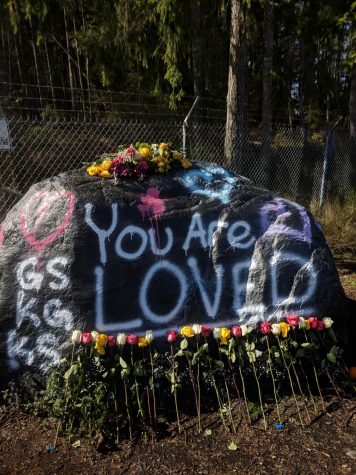Good Grief: How Mourning Can be Therapeutic
September 24, 2018

When you lose something, a reaction is inevitable. It can be as small as losing a toy from your childhood or a balloon right after your party, but the biggest loss can be someone you love. As humans we have a certain way of grieving, we all deal with this in different ways. As teens, It’s important to acknowledge these feelings and accept that grieving is a normal phase of life.
When someone important has left your life, you react, whether that is to cry, be angry, or even to deny it all and refuse to believe it happened. But it’s okay to have a different reaction altogether, everyone grieves differently. So, it’s okay if someone is crying uncontrollably while you’re just standing there in shock. Zackary Pittis, one of the AP Psychology teachers, says that there isn’t one distinct way to grieve. Pittis believes that when it comes to grieving, to each his own. Especially when it comes to the 5 stages of grief, Pittis believes there’s no specific order. Some people may even skip a stage or two, it all depends on the individual. “It’s really hard to say what kind of effect [grieving] would have on each person. It’s so unique to everybody.”
The Animal Science, Floral Design teacher and FFA adviser, Marie Page had lost her father to a car accident as well as two of her students. Page gave some examples as to what a grieving person would look like, “if you see someone who is in tears, gloomy, someone who goes from being happy to all of a sudden sad, talk to them” Page says that the best way is to constantly make sure that they are okay and they have a way to get help, whether it would be a counselor or their parents. Page brings that up because when she went through the loss of her father, she would ignore the sadness and tried to be strong for other people. She acted like everything was okay and didn’t tell anybody what she was actually feeling on the inside. The final thing that Page said was to those who have lost someone “the pain will never go away but it will get better.”
Even though you should never forget the person who passed, you should always try to live your best life to honor those we’ve lost, knowing that it’s what they would want us to do. We can all find things throughout our lives to do to show the ones we’ve lost that we love them. Whenever you are experiencing grieving in your life it’s important to understand that there are many other people around our school and beyond who are either currently going through grieving or have in the past. Grieving alongside friends and family can help some people gain perspective on their experience and find tips for how to deal with it. Of course, there will always be those who will feel better talking to a professional who can look at the situation objectively and has plenty of time to listen. Our school counselors are always here for students, and are always able to set up any student having a difficult time with extra counseling services through a program called Nexus. This program can help students at school or in their agency with different therapy models, if you or a student you know is currently struggling it can be helpful to set them up with our school counselors. Grieving is a difficult process for everyone and it’s important to respect and understand how everyone else wants to do things, even if that way is different from your own.
Whenever we have lost someone it’s difficult to understand where we should go from here and how we should deal with our loss. The important thing to remember is that everyone will deal with grief at some point in there lives and everyone manages those feelings differently. Whichever way will work for you is perfect as long as it helps you get through your time of grieving.
Information for struggling students:
information from King County Public Health
- The Suicide Prevention Lifeline: 1-800-273-8255.
- Teen Link, which offers peer counseling from teens who are trained in crisis intervention. Teen Link is available from 6pm to 10pm by calling 206-461-4922.
- Crisis Text Line: Text START to 741741 from anywhere in the US, anytime, about any type of crisis. A live, trained crisis counselor receives the text and responds quickly.





John Jiler • Dec 3, 2018 at 11:32 am
THE NOTORIOUS NINETEEN
Dear Editor;
Autumn is deepening, and seniors are thinking harder and harder about their next step. For many of us, your generation is the hope of the future. The Parkland high school shootings galvanized young people across the nation to passionately advocate for common sense gun laws. Now, as your attention turns to college, we want to turn our admiration into action.
With the help of the Brady Center, the new Gabby Giffords consortium, Everytown for Gun Safety and the Columbia Scholastic Press Association, we’re reaching out to high school journalists across the country with our list of the NOTORIOUS NINETEEN—the states with dangerous, inadequate gun laws. Many of them condone the open carry of weapons on college campuses, but even those who don’t have encouraged or tolerated a state-wide lawless and violent culture. Our mission is to make these states known to high school seniors, whom we encourage NOT to apply to college in:
ALABAMA, ALASKA, ARIZONA, ARKANSAS, FLORIDA, GEORGIA, IDAHO, KANSAS, KENTUCKY, MISSISSIPPI, MISSOURI, MONTANA, NEW HAMPSHIRE, NORTH DAKOTA, OKLAHOMA, TEXAS, UTAH, WEST VIRGINIA, or WYOMING.
We’ll be following up with letters to college presidents, Governors and legislators of the “Notorious Nineteen.” If they’re curious why their state-wide college applications are down this year, we’ll be happy to tell them!
Thank you for considering the publication of this letter in your newspaper. This is how the world changes. Good luck throughout senior year…… and beyond!
Best,
John Jiler,
Coordinator,
Committee for Scholastic Action On Guns